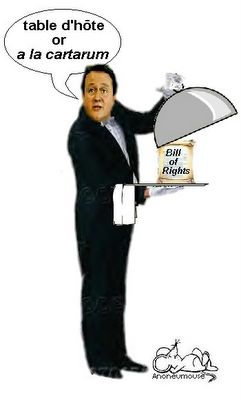table d'hôte or a la cartarum
Section 11 of the Human Rights Act 1998
A person's reliance on a Convention right does not restrict-
(a) any other right or freedom conferred on him by or under any law having effect in any part of the United Kingdom;

(Hansard, 21 July 1993 column 352), There has of course been no amendment to the Bill of Rights…the house is entitled to expect that the Bill of Rights will be fully respected by all those appearing before the courts.'
"The Rights of the people had been confirmed by early Kings both before and after the Norman line began. Accordingly, the people have always had the same title to their liberties and properties that England's Kings have unto their Crowns. The several Charters of the people's rights, most particularly Magna Carta, were not grants from the King, but recognition's by the King of rights that have been reserved or that appertained unto us by common law and immemorial custom."
(Sir Robert Howard, a member of the Committee's which drafted the Bill of Rights).
Confirmatio cartarum [25 Edw. I][29]
"No Freeman shall be taken, or imprisoned, or be disseised of his Freehold, or Liberties, or free Customs, or be outlawed, or exiled, or any otherwise destroyed; nor will we pass upon him, nor condemn him, but by lawful Judgment of his Peers, or by the Law of the Land." Note: in the 1354 version, "by the law of the land" was changed to "by due process of law." We will sell to no man, we will not deny or defer to any man either Justice or Right.
.
A person's reliance on a Convention right does not restrict-
(a) any other right or freedom conferred on him by or under any law having effect in any part of the United Kingdom;

(Hansard, 21 July 1993 column 352), There has of course been no amendment to the Bill of Rights…the house is entitled to expect that the Bill of Rights will be fully respected by all those appearing before the courts.'
"The Rights of the people had been confirmed by early Kings both before and after the Norman line began. Accordingly, the people have always had the same title to their liberties and properties that England's Kings have unto their Crowns. The several Charters of the people's rights, most particularly Magna Carta, were not grants from the King, but recognition's by the King of rights that have been reserved or that appertained unto us by common law and immemorial custom."
(Sir Robert Howard, a member of the Committee's which drafted the Bill of Rights).
Confirmatio cartarum [25 Edw. I][29]
"No Freeman shall be taken, or imprisoned, or be disseised of his Freehold, or Liberties, or free Customs, or be outlawed, or exiled, or any otherwise destroyed; nor will we pass upon him, nor condemn him, but by lawful Judgment of his Peers, or by the Law of the Land." Note: in the 1354 version, "by the law of the land" was changed to "by due process of law." We will sell to no man, we will not deny or defer to any man either Justice or Right.
.



0 Comments:
Post a Comment
<< Home